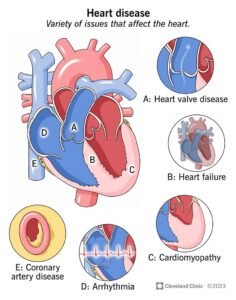 Heart disease is the number one cause of mortality and a silent epidemic among Indians. 8 billion happens to be the world’s population, as of 2023, and 620 million people out of it suffer from cardiovascular diseases which are responsible for third of the deaths globally, a total of around 18 million people face the fall from it.
Heart disease is the number one cause of mortality and a silent epidemic among Indians. 8 billion happens to be the world’s population, as of 2023, and 620 million people out of it suffer from cardiovascular diseases which are responsible for third of the deaths globally, a total of around 18 million people face the fall from it.
In 2022, over 32,457 Indians died due to heart diseases recorded National Crime Bureau and there are numerous reasons for the same ranging from unhealthy eating habits to high blood pressure.
Cardiovascular diseases are akin to hidden threats lurking within every Indian, irrespective of age. The shift towards urban living in India has led to reduced physical activity and increased mental stress. This combination of less movement and heightened stress contributes to the prevalence of heart issues. Additionally, the consumption of high-sugar and heavily processed foods further exacerbates the situation.
Reason for inflation in heart disease rates
According to a study conducted in Jaipur, the highest prevalence of risk factors included hypertension (36.9%), tobacco use (23.9%), obesity (63%) and hypercholesterolemia (39.1%). Diabetes was prevalent in 12.2% of the cases. Thus the study highlighted the presence of high prevalence of CAD and risk factors in the sample.
Indian Heart Association records that India, particularly the city of Hyderabad in the state of Andhra Pradesh, is currently the diabetic capital of the world . Indians have been affected by high rates of diabetes, metabolic syndrome, hypertension, and smoking. These are major risk factors for cardiac disease.
When cardiovascular disease strikes Indians, it tends to do so at an earlier age (almost 33% earlier) than other demographics, often without prior warning. Furthermore, 50% of all heart attacks in Indian men occur under 50 years of age and 25% of all heart attacks in Indian men occur under 40 years of age, a staggering figure. Indian women have high mortality rates from cardiac disease as well.
There is a notable paucity of public health infrastructure and initiatives in India to raise awareness about this important issue. Asians are at particularly high risk for ischemic and hemorrhagic (bleeding) stroke.
Habits to incorporate in daily life to keep heart health in check:
 1. Don’t smoke or use tobacco products: Substances found in tobacco can harm the heart and blood vessels. Smoking reduces oxygen levels in the blood, leading to increased blood pressure and heart rate. This puts added strain on the heart as it works harder to provide sufficient oxygen to the body and brain.
1. Don’t smoke or use tobacco products: Substances found in tobacco can harm the heart and blood vessels. Smoking reduces oxygen levels in the blood, leading to increased blood pressure and heart rate. This puts added strain on the heart as it works harder to provide sufficient oxygen to the body and brain.
 2. Body movement: It’s recommended to dedicate at least 30 minutes each day to regular exercise. This could involve activities such as cycling or brisk walking that elevate your heart rate, ultimately contributing to improved heart health.
2. Body movement: It’s recommended to dedicate at least 30 minutes each day to regular exercise. This could involve activities such as cycling or brisk walking that elevate your heart rate, ultimately contributing to improved heart health.

3.Eat a heart-healthy diet: A heart-healthy diet is crucial for protecting the heart, improving blood pressure and cholesterol levels, and reducing the risk of type 2 diabetes. Key components of such a diet include vegetables, fruits, lean meats, fish, low-fat dairy, whole grains, and healthy fats like olive oil and avocado. Examples of heart-healthy eating plans include the DASH diet and the Mediterranean diet. It’s important to limit intake of high-sodium foods, sugary beverages, processed carbohydrates, alcohol, processed foods, saturated fats, and trans fats.

4. Get quality sleep: Ensuring you get 7-9 hours of uninterrupted, high-quality sleep each night is essential for overall health and well-being. Adequate sleep supports heart health, regulates blood pressure, and reduces the risk of cardiovascular issues. Additionally, sufficient sleep helps manage stress levels, promoting mental clarity and a positive mood throughout the day.

5. Practice yoga and meditation practices: Incorporate practices such as Pranayama and meditation into your routine as effective tools to combat stress. Stress can trigger the release of cortisol, diverting the body’s focus away from critical functions necessary for heart health. By engaging in these practices, you can shield yourself from the harmful effects of stress and promote overall well-being.
Ultimately, maintaining a healthy heart is achievable through making informed lifestyle choices. By cultivating healthier habits, individuals can effectively ward off heart diseases.










